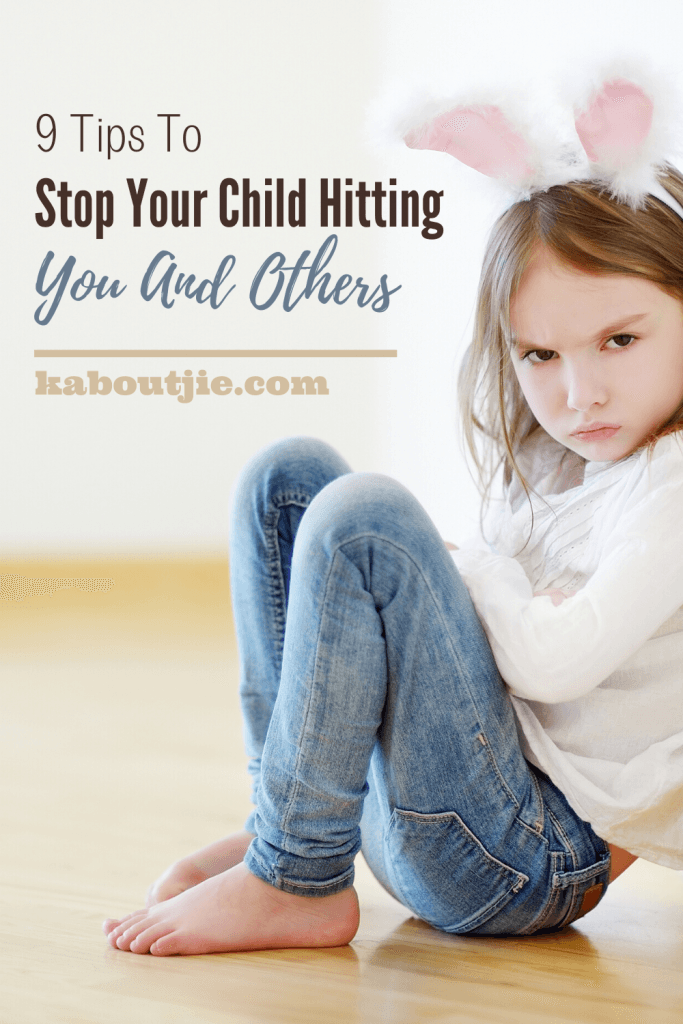When your child gets to the stage where they are hitting others it can be a highly stressful situation. You may feel that your parenting or your little one is being judged and you also may feel concerned for the “victims” while trying to work out which way is the best method of going forward and addressing the problem correctly and efficiently. There are useful things you can do to stop your child hitting and prevent it from becoming a long-lasting habit.

How To Stop Your Child Hitting
-
Start looking for a pattern behind the incidents and work on prevention
Start making a mental note of when your toddler is most likely to strike out and have a meltdown. This usually occurs when he is hungry or just before nap time. If you notice any signs of frustration, try to create a distraction or offer to help them. Sometimes all he needs is a little attention from Dad or Mom to calm down, which will make him less likely to bite or hit. Establishing why and when your child is likely to engage in hitting, can help you work out the best way to address it on the spot and to prevent it from happening. Toddlers usually lash out because they are not yet capable of understanding or expressing these feelings of frustration and are more prone to tantrums as a result.
-
Considering if a significant change in their life may be the cause of such behaviour
Major changes in a child’s life can make them feel unsettled i.e., a family separation, a new addition to the family or a parent returning to work can increase their need of attention. Children seek attention and sometimes is not always with good behaviour. Pre-schoolers and toddlers often resort to hitting to get a reaction.
-
Observing whether their frustration levels are triggered by certain factors
Feeling tired, scared or hungry can bring on tantrums or aggression. Children who starts attended nursery school or a playgroup may struggle with sharing toys or taking turns. Hitting is often a way of expressing their emotions or feelings of discomfort.

-
Addressing any triggers or underlying causes
Find a practical way of addressing the issue if you know there’s an underlying issue that triggers the behaviour. If you know your child struggles with sharing or have trouble adjusting in a nursery environment at first, discuss it with the staff to find ways to make him feel more comfortable in settling in. Engaging in role play can be an excellent solution. For example if hitting is a form of getting attention, try to set aside time with just you and him to cuddle, share a toy or talk about their day. It’s important for them to acknowledge that you show interest and that you make time to listen to them and just chat.
-
Deciding on a response in advance before future incidents and discuss it with his carers
It’s no use feeling embarrassed or stressed and feeling unsure about how to address the behaviour when it happens. Decide beforehand how the issue must be addressed and make sure his carers, grandparents etc. are on the same page. Consistency is key when you’re dealing with a toddler, as the don’t respond well to change and it’s no use if the issue is not handled in the same way every time as it will just end up confusing him.
-
Having an immediate and clear response
The instant biting or hitting occurs, make sure you remove him immediately from the situation and make a statement in a strict voice. Make sure you tell them that hitting is wrong and that it hurts when you hit someone. Over explaining things will not work and it may just backfire. The more you engage in conversation, the more attention he gets about the aggression. You need to act quickly, as a delay in response until you get home will be too late for them to make a connection between the behaviour and the consequences. Be sure to act immediately. It helps to be firm about hitting, make them apologize and then removing them from the setting for some time-out.
-
Avoid responding with hitting to show them what it’s like
Never bite or hit your child to show them how it feels, contrary to popular belief. It will only end up confusing them and give them the impression that it’s ok to act this way when you’re getting annoyed. Also, never laugh because it will have the same affect.

-
Showing them empathy
It’s difficult for toddlers to understand these feelings of frustration and anger when they are at this age. But it’s always beneficial to label these emotions. Try showing some empathy and say to him that you know why they feel the way they do and more importantly, employ positive reinforcement for good behaviour. For example, give praise when he shares a toy or showed restraint by not hitting or biting. It will inspire good behaviour in future.
-
Keeping an eye on them
If you know your child is a candidate for hitting, make sure you’re keeping an eye on them when they’re playing around other kids. It’s essential to be vigilant and make an effort in addressing the issue as soon as it occurs. You’ll also find that the other child’s parents are a little more forgiving if they see that you are vigilant and are working on the issue. As hard as it may seem, always make sure you keep your emotions in check. Never act out of anger. Keep reminding yourself that this behaviour is temporary and will blow over eventually. Most toddlers go through these stages for a few months. Something this short-lived is generally not something you should worry about.
Children’s books that can assist in teaching your child not to hit others
- Hands are not for hitting – Howard Hughes
- Little monkey calms down – Michael Dahl
- When I feel angry – Albert Whitman & co
 Kaboutjie SA Mommy Blogs by Lynne Huysamen
Kaboutjie SA Mommy Blogs by Lynne Huysamen








A very interesting read Lynne. Looking back, I actually can’t recall any of my children going through this phase. Perhaps I was just lucky or I have a very bad memory! LOL. I actually never understood why children react this way, I have a better understanding now. Thank you.
Perhaps you have only girls Gwen? I never had a problem with my daughter hitting but with my son we have had quite a hard time with it. I think perhaps because girls are so much better at expressing themselves and their feelings it is easier. Thankfully we are now moving past this stage with my son.
Such a great article, and I for one, am so pleased that people no longer employ the hitting and biting back tactic. It is amazing how often hunger or tiredness is the cause of tantrums, and if they happen at odd times, these factors can often be overlooked
Jenny I just cannot understand how hitting or biting your child back can teach them not to hit or bite. I always tell my kids unless you are literally fighting for your life there is never an excuse to hit, bite or be physically violent in any way. I need to make sure that when I parent I do what I say.
Aah! This reminded me of the time when my son was in grade 2. There was a boy in this class who would hit him (and other kids). It was a harrowing time, frequently meeting/calling teachers and speaking to that child and finally his parents…. They had to consult a counselor and that helped a bit. Thanks for sharing this informative post!
I am so sorry you and your son had to go through that Shilpa – I had numerous incidents with my son being bullied and hurt last year. He was in Grade R and it was so hard to deal with, especially since then my son started acting out too! Thankfully only at home with me so I could deal with it with properly. I will be writing a post soon on how to cope with bullying.
It is stressful indeed! Perhaps some kids take out their frustration with their peers-and if they’re being hit at home, gosh, that could be a reason too. I’ve seen kids being violent and my heart just goes out to them because who knows what they are dealing with. And yes, some parents just hit them back making things far worse. These are wise tips, Lynne. One has to get behind the reason for the child’s behavior as it can have far-reaching consequences later in life, otherwise.
I remember one mom and her toddler visited us just as we were moving and while we were talking the toddler threw a tantrum and then slapped her mom. We were shocked. The mom apologized to the child making things even worse. So sad.
Yes I totally agree with you Vidya! One of the boys that bullied my son at school was abused by his father so I felt terrible for him… but my poor boy had to bear the brunt of that and then my boy started smacking me at home. I am so grateful that is now all resolved and my son is doing well.